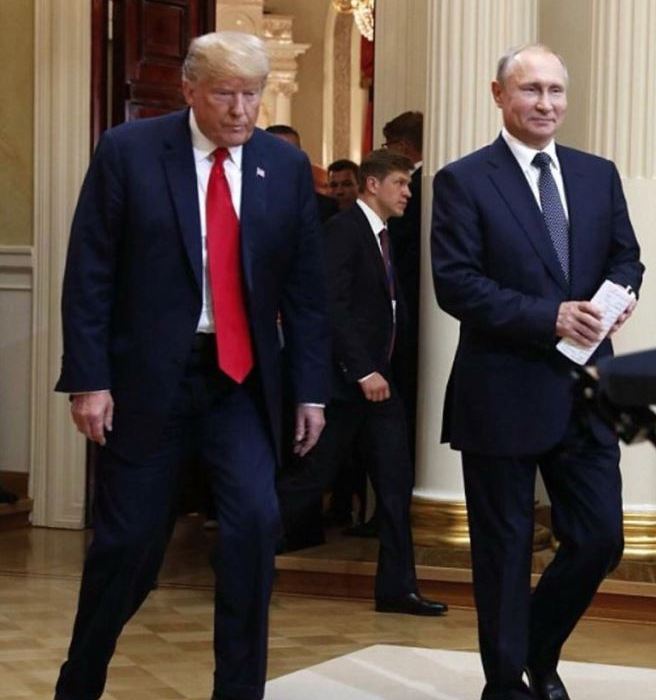The Republican attempt at impeaching President Joe Biden on the basis of his son’s actions has collapsed with the revelation that their star witness, Alexander Smirnov, was working with Russian intelligence. They’re trying to put up another, even weaker, attempt at impeachment to distract from this embarrassment.
The Russians have interfered in the last several US elections. They have used bots to distribute misinformation on social media along with much more complex operations. The release of Hillary Clinton’s emails had Russian involvement. And now we learn that Hunter Biden’s laptop was a Russian operation.
All Russian involvement is dangerous. Spreading divisive conspiracy theories undermines voter choices. Co-opting legislators, and those legislators’ willingness to be co-opted is of another order. Republican House members who have pushed for impeachment have been duped by Russia, in the kindest interpretation. An intermediate interpretation is that their eagerness to undermine a Democratic administration made them vulnerable to Russian influence. And it is fully possible that they find Russia a more amenable partner than their own Democratic fellow citizens and are therefore happy to push its narratives.
At the top, of course, is Donald Trump, who long wanted a Trump Tower in Moscow. President Donald Trump, who came out of a meeting with Vladimir Putin in Helsinki and said that he believed Putin over the US intelligence services on Russia’s interference in elections. Whose sons gleefully said they’d accept Russian help to get their father elected.
Since 2015, we have learned that Russians infiltrated the NRA, and through them, the Republican Party. Republicans often see Russia as the autocratic, religious, white supremacist country they would like to have.
The stories come out one at a time, spaced far enough apart that it’s easy to miss the continuing theme. Republicans, as they are doing now, deny or ignore their mistakes and wrongdoing. The New York Times puts the Smirnov story on page A16.
Josh Marshall says the latest story is bigger than you can possibly imagine. I think he’s right, but I think we need a narrative. There are links among the various stories on Russian interference that most reporters miss – for example, I had been aware of Gal Luft for a long time. He was peripherally involved in retired General Michael Flynn’s plans in 2015-2017 to sell Russian nuclear reactors to Saudi Arabia. There are undoubtedly many of these links. But they may not provide the best way to construct a narrative.
The numbers of people and schemes are enormous. It’s tempting to try to center a narrative on Trump, but he is canny about keeping himself at arm’s length from the dirty stuff, so there is not a single clear way to talk about, say, Trump and a particular Russian operative or group of operatives. It’s important to keep a narrative simple, with sound bites.
In the last few days, the Washington Post has run two stories that take a broader look at Russian corruption in US presidential elections.
The more general of the articles begins with Trump’s recent invitation to Russia to mess with nations that don’t pay their protection money to NATO and other ways in which Trump has extended a hand to Russia. It begins to frame around a question:
With Trump, why do “all roads lead to Putin?” as then-Speaker Nancy Pelosi (D-Calif.) memorably asked in 2019 during a contentious Cabinet Room meeting.
But then dissolves into dueling quotes from a wide variety of people. Maybe Trump just likes autocratic leaders.
The other article is more interesting. It goes into specifics.
This isn’t even the first time we’ve learned that a person has been indicted after the GOP cited his claims. Nor is it the first time a person has been linked to Russian intelligence after the GOP leaned on their version of events.
The cast of characters Republicans have sought out to substantiate President Biden’s purported corruption over the years has come to include half a dozen convicted and accused criminals, as well as multiple people the U.S. government has linked to Russia, corruption and subverting American democracy.
There is Smirnov, of course. Also Gal Luft, Viktor Shokin, Andriy Derkach, Igor Fruman, and Lev Parnas. Further back are Paul Manafort’s old friends.
A bipartisan 2020 Senate Intelligence Committee report cited 2016 Trump campaign chairman Paul Manafort’s sharing of information with Vladimir Putin-linked oligarch Oleg Deripaska and Konstantin Kilimnik, whom it described as a “Russian intelligence officer.” It said the arrangement “represented a grave counterintelligence threat.”
Kilimnik was indicted alongside Manafort in 2018. Deripaska was sanctioned by Trump’s Treasury Department in 2018 and indicted in 2022.
Manafort might be a good place to start. I plan to continue to think about how to construct this narrative.
Image: Donald Trump and Vladimir Putin emerge from their summit in Helsinki in 2018 on their way to podiums, where Trump endorsed Putin over the US intelligence services.
Cross-posted to Lawyers, Guns & Money
